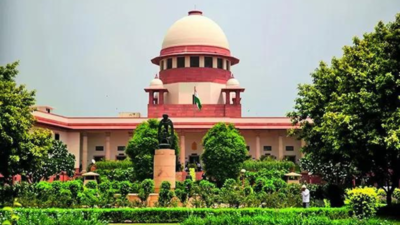- News
- India News
- Watching, downloading child pornography are offences under POCSO Act: SC
Trending
Watching, downloading child pornography are offences under POCSO Act: SC
The Supreme Court has overturned a Madras High Court ruling, stating that downloading and viewing child pornography are punishable offenses under the POCSO Act and IT law. The court also recommended replacing the term 'child pornography' with 'child sexual exploitative and abuse material,' marking a significant legal precedent in addressing such crimes.

Supreme Court of India
NEW DELHI: The Supreme Court on Monday overturned a Madras high court order that stated merely downloading and viewing child pornography did not constitute an offense under the POCSO Act and IT law.
A bench comprising Chief Justice D Y Chandrachud and Justices J B Pardiwala and Manoj Misra ruled that both downloading and watching child pornography are punishable offenses under the POCSO Act and the IT law. The bench also provided guidelines regarding child pornography and its legal implications.
The bench also provided guidelines regarding child pornography and its legal implications.
"We have said about lingering impact of child pornography on victimisation and abuse of children and on role to report an offence, including role of society and stakeholders," the bench said.
"We have suggested to Parliament to bring an amendment to POCSO... so that definition of child pornography can be referred to as 'child sexually abusive and exploitative material'. We have suggested an Ordinance can be brought in," it said.
Deeming the Madras high court's decision to quash the
As Justice Pardiwala said he was beholden to CJI for giving him opportunity to write the judgment, CJI Chandrachud said it is a landmark judgment and the first instance in world where law on child sexual exploitative and abuse material is dealt in such detail by judiciary.
The Madras high court had previously quashed a criminal case against a 28-year-old man charged with downloading and viewing child pornography on his mobile phone. The high court had granted relief, stating that to constitute an offense under Section 67-B of the IT Act, 2000, the accused must have published, transmitted, or created material depicting children in a sexually explicit act or conduct.
The high court had also noted that children nowadays face the serious issue of watching pornography and that society should focus on educating them rather than punishing them.
A bench comprising Chief Justice D Y Chandrachud and Justices J B Pardiwala and Manoj Misra ruled that both downloading and watching child pornography are punishable offenses under the POCSO Act and the IT law.

"We have said about lingering impact of child pornography on victimisation and abuse of children and on role to report an offence, including role of society and stakeholders," the bench said.
"We have suggested to Parliament to bring an amendment to POCSO... so that definition of child pornography can be referred to as 'child sexually abusive and exploitative material'. We have suggested an Ordinance can be brought in," it said.
The apex court's decision came in response to a petition challenging the Madras high court's ruling. The Supreme Court had previously consented to hear the plea, which argued that the high court's decision contradicted existing laws on the matter. Senior advocate H S Phoolka, representing two petitioner organizations, highlighted this discrepancy to the court.
Deeming the Madras high court's decision to quash the
criminal proceedings an "egregious error," the Supreme Court overturned it and reinstated the criminal prosecution. Additionally, the SC called upon Parliament to replace the term "child pornography" with "child sexual exploitative and abuse material (CSEAM)" through an ordinance.
As Justice Pardiwala said he was beholden to CJI for giving him opportunity to write the judgment, CJI Chandrachud said it is a landmark judgment and the first instance in world where law on child sexual exploitative and abuse material is dealt in such detail by judiciary.
The Madras high court had previously quashed a criminal case against a 28-year-old man charged with downloading and viewing child pornography on his mobile phone. The high court had granted relief, stating that to constitute an offense under Section 67-B of the IT Act, 2000, the accused must have published, transmitted, or created material depicting children in a sexually explicit act or conduct.
The high court had also noted that children nowadays face the serious issue of watching pornography and that society should focus on educating them rather than punishing them.
End of Article
FOLLOW US ON SOCIAL MEDIA











